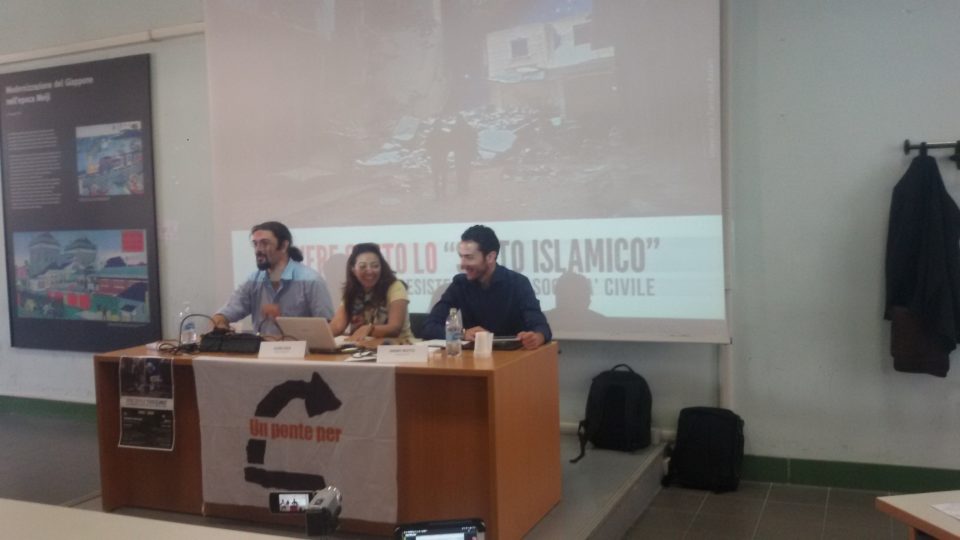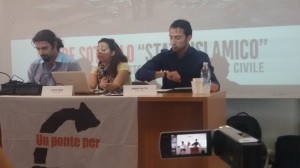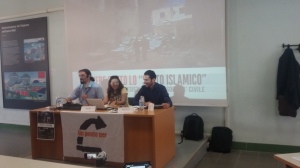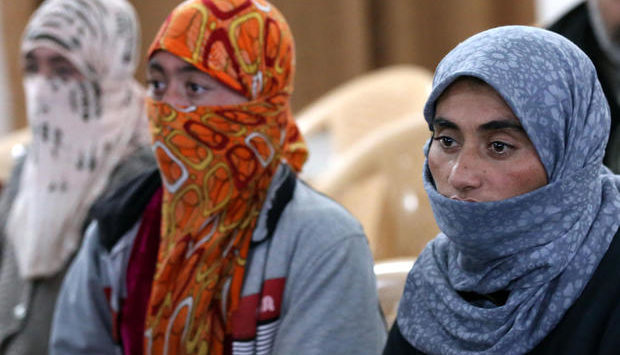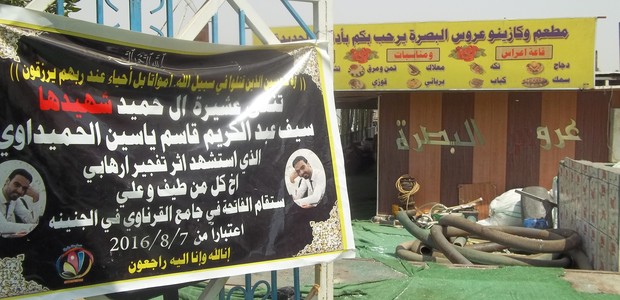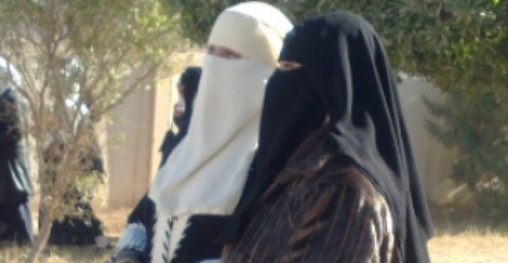The Mosul Crisis: its Roots, Daesh’s Terrorist Practices, and their Impact on Women
Suha Auda – Mosul
Iraqi Women Journalists Forum, in cooperation with the Iraqi Civil Society Solidarity Initiative (ICSSI), and Un Ponte Per Organization (UPP)
Paper prepared for the hearings in the Italian Parliament, June 2015
To talk about conditions in Mosul today, ways to overcome the crisis and to address the practices and violations of Daesh within the city, we should first review the realities of daily life and the status of women before the city was occupied by the extremist organization.
- Mosul Before Daesh Entered the City
Mosul is the center of Nineveh province where nearly two million people live. Its citizens belong to different ethnicities and religious denominations: Arab, Kurdish, Turkmen, and Shabak minorities, both Sunnis and Shiites, as well as a significant population of Christians, both Chaldean and Eastern Orthodox.
Daily life in Mosul suffered from a general lack of security; the city experienced car bombings and attacks with improvised explosive devices. Mosul experienced significant disputes between the provincial council of the local government and the leadership of the forces responsible for ensuring the city’s security; these forces were closely associated with and received their orders from the office of Prime Minister Noori Al-Maliki. Mosul did not have an army or security forces of its own citizens; most of the army personnel were from the middle and south of Iraq and were Shiite. They could not build trust or confidence with Mosul’s citizens, who never felt that the security forces were there to protect them, but rather to control and crush them.
Atheel Al-Nujaifi, the Governor of Mosul, was a weak leader who failed to provide services to the city. His administration was notorious for its corruption, especially the scandals involving contracts for “phantom projects” with Turkish companies.
Nineveh province, in general, suffered from tense and strained Arab-Kurdish relations, because of the role Asayish, the Kurdish security forces, plays in controlling areas of Nineveh Plain such as Talkeef, Sinjar, Ba’shiqah and Hamdania. These were formerly part of Nineveh province, but after 2003 they became territory that is disputed between Nineveh and the Kurdistan region. Kurds began to dominate these areas and prevented Arabs from buying homes in them; at the same time, it became very difficult for Arabs to enter these disputed areas around Mosul.
Women in Mosul were officially free to work in the government and the private sector. Education in various fields was available. However, custom and tradition, as well as religion, which are the forces that influence people’s lives, frequently led women to experience persecution and violence. Underage marriage of girls as young as 12 years, cases of suicide (often by self-immolation) in order to escape violence, and “honor-killings” were among the abuses women suffered. Usually, these abuses were never reported or registered because of parents’ reluctance and a general lack of recognition of women’s rights.
- The Emergence of Extremism in the City:
Mosul is well known for its religious character and its many mosques and religious shrines of the Muslim prophets. Those mosques were often gathering places for extremist Salafist and Wahhabi groups. Al-Qaeda first emerged in Tala’afar, in 2004, among Sunni Turkmen. Later, in 2006, it moved to Mosul and escalated its activities. It began its attacks on the Americans and also on Iraqi civilians, including crimes of murder and rape, and the systematic expulsion of Yazidis and Christians. Even after the “cleansing” of the city, in 2007, Al-Qaeda did not cease its activities but continued to terrorize the civilians with threats and demanding ransoms, planting roadside bombs and car bombs targeting civilians as well as the military and police forces. These terrorist acts by Al-Qaeda escalated dramatically two months before Daesh entered Mosul, when the organization’s sleeper cells emerged and aided the occupation of the city.
- The Situation after the Entry of Daesh
Upon entering Mosul, Daesh gangs violated all human rights. The first was the right to life of women and men alike. On June 10th, the organization issued its own “Constitution” that they called the “City Document”. This document consisted of 16 paragraphs stipulating that Christians and Shabak Shiites would have to leave the city, be killed, or convert to Daesh’s version of Islam. Religious monuments and shrines associated with religious traditions Daesh did not approve of were destroyed. Women were prevented from going out or working, except in medicine and teaching. Daesh continues to enforce these regulations.
The organization executed large numbers of women and men. It carried out a massive campaign, arresting dozens of women who were taken to Daesh’s “Sharia Court”. Since September the court has decreed the execution of approximately 30 women, three of whom were doctors (Inas Khatab, Souad al-Tai, and Ban Abdul Aziz) and two of whom were lawyers (Samira Al-Naimi and Najla’a Al-Omari). Many other professional women were kidnapped and murdered. The former parliamentarian Iman Mohammed Al-Salman was abducted and killed; then her body was thrown into a well somewhere north of her district of Tala’far. University professor Hanaa Fakhri was beheaded before her children’s eyes. All of these victims were women of the Sunni Muslim religion.
Eight or nine mass graves have so far been found inside and outside Mosul; they contained mostly women and children. Dozens of men – members of the army, police and doctors in Mosul – were also killed or kidnapped. Journalists and activists were executed. Hundreds of bodies of those executed by Daesh were never returned to their families; instead, the gangs threw them all into an immense hole 50 meters in diameter, called “Alkhasfa”, which is located in the village of Al-Athba 20 km south of Mosul. Currently Daesh carries out its executions in the streets and public markets; they are filmed and then openly disseminated on social networking sites.
- The Right to Liberty
There are hundreds of people inside Daesh prisons, women and men, even children. Most of them are suffering skin diseases and scabies. Daesh holds them in Al-Faisaliah prison, juvenile prisons, and Badush prison (before it was destroyed), and many other secret and unknown prisons. The number of women prisoners in Al-Faisaliah reached 100. Prisoners were subjected to beatings, flogging and humiliation. In July, 30 prisoners were killed in a juvenile prison after it was bombed by international coalition aircraft.
Many women from Mosul have been forced into marriages with members of Daesh that their fathers or uncles or other men in charge of the women permitted. Most of these were underage girls who were married off to dangerous leaders in the organization and then deported outside Iraq, particularly to the Syrian city of Al-Raqqa. The guardianship of women by men in Iraqi society is based upon repressive customs and traditions, and along with weak laws that do not protect women’s rights leads to great discrimination.
Women in Mosul, starting from the age of 9 years, are forced to wear black robes and veils, and gloves and socks. They are prevented from going out to work. Women are also prevented from going out into the street without a Mahram, a male from their family: a son, husband or brother. Fines are imposed on taxi drivers who transport unaccompanied women. The organization also prevents residents from traveling; Daesh’s security commissions allow only one family member to travel and only after mortgaging their house or other property. Men are forced to have long beards and attend prayers in the mosques. Smoking is banned. Citizen who violates these orders face sanctions such as flogging or imprisonment.
Health institutions suffer from a shortage of drugs. Many women’s surgeries were performed without painkillers. There is also a shortage of medicines for chronic diseases, including diabetes, hypertension, asthma, cancer, and thalassemia. The incidence of miscarriages and newborn mortality are increasing. Every week approximately ten children die because of the poor mental health or malnutrition of their mothers, or poisoning due to lack of sterile materials. Daesh has taken over the city’s hospitals almost entirely to treat their own members who were wounded because of the fighting and bombing, and prevents citizens from entering hospitals. Doctors and nurses are forced to work and provide treatment for Daesh members.
5. The Role of the Iraqi Government and Kurdistan Regional Government in Providing Services to the People and IDPs of Mosul
The Iraqi Government is currently behaving as though the city of Mosul is not part of Iraq. It halted the payment of government salaries, which is the main source of livelihood for most Iraqis, including thousands of employees, especially health workers. Mosul’s population is growing destitute and suffering especially from rising food prices. Electricity to the city has been cut off since July of 2014. Medical supplies are scarce and what enters the city is either diverted to Daesh or must be smuggled to civilians. Fuel and gas were also cut off and citizens now cook and heat with wood. Online networks and communications do not work.
Mosul is now inhabited by approximately a million and a half civilians, citizens of Mosul but also from elsewhere in Anbar and Salahdin provinces, especially Tikrit, from which thousands of families were displaced. All these civilians have been reduced to the same level of poverty and need. They are suffering from a complete lack of services. No local or international civil society organizations were observed playing a role in providing assistance to civilians in Mosul.
The Kurdistan Regional Government has closed off all roads connecting Mosul with Kirkuk, Erbil, and Dohuk. It blew up several bridges that link the city with the province. Peshmerga and Yazidi forces have been involved in fighting in the now liberated areas in Sinjar. They have been responsible for the deportation and killing of a number of members of the Arab tribes in revenge for the killings, rapes, and enslavement the Yazidis suffered at the hands of Daesh and those from the province of Nineveh who aided Daesh.
6. Proposals on the Role of the European Union and Italy to Help the Government of Iraq Overcome the Crisis
- Partnership between Iraq and the UN to implement transitional justice in the liberated areas, including Truth and Reconciliation commissions, building sustainable peace among the different segments of society, and preventing reprisals. We can learn lessons from elsewhere in the world; especially we should consider South Africa as a model.
- Support and encourage the Government of Iraq to implement equality in law and practice: end the sectarian politics and practices of discrimination against and exclusion of citizens because of their sex, race, religion or beliefs.
- Support women in conflict zones with relief programs, including opening shelters for women victims of violence, and providing them with medical and psychological support services.
- Support Iraq to train government security forces that contribute to the battles for liberation and to manage the liberated areas. The training must include international humanitarian law, how to deal with women and children, and civilians in general.
7. Proposals on the support of Iraqi civil society
Iraqi civil society did not cease its activities despite these dire circumstances and the inability to work in Mosul and the other cities occupied by Daesh. We have continued in the Iraqi Women Journalists Forum, and other civil society organizations, with our very clear objective: to work in order to change the reality of Iraqi women. Months ago, we launched the Shahrazad Campaign to end violence against women, underage marriage, and sexual harassment. The Campaign includes awareness and advocacy programs. I call on the Italian government and the European Union to support Iraqi civil society, its projects for the defense of women’s rights in Iraq, and its programs for the empowerment of women. Partnership between Iraqi civil society and Europe must be strengthened because this is the best way to support Iraq in the long term.

